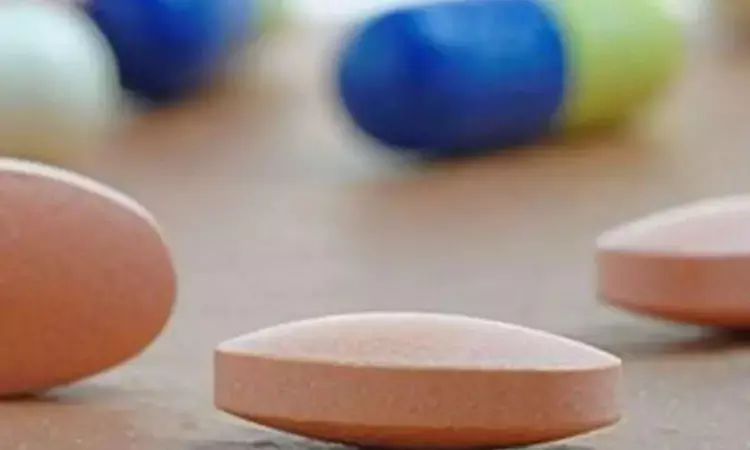- Home
- Medical news & Guidelines
- Anesthesiology
- Cardiology and CTVS
- Critical Care
- Dentistry
- Dermatology
- Diabetes and Endocrinology
- ENT
- Gastroenterology
- Medicine
- Nephrology
- Neurology
- Obstretics-Gynaecology
- Oncology
- Ophthalmology
- Orthopaedics
- Pediatrics-Neonatology
- Psychiatry
- Pulmonology
- Radiology
- Surgery
- Urology
- Laboratory Medicine
- Diet
- Nursing
- Paramedical
- Physiotherapy
- Health news
- Fact Check
- Bone Health Fact Check
- Brain Health Fact Check
- Cancer Related Fact Check
- Child Care Fact Check
- Dental and oral health fact check
- Diabetes and metabolic health fact check
- Diet and Nutrition Fact Check
- Eye and ENT Care Fact Check
- Fitness fact check
- Gut health fact check
- Heart health fact check
- Kidney health fact check
- Medical education fact check
- Men's health fact check
- Respiratory fact check
- Skin and hair care fact check
- Vaccine and Immunization fact check
- Women's health fact check
- AYUSH
- State News
- Andaman and Nicobar Islands
- Andhra Pradesh
- Arunachal Pradesh
- Assam
- Bihar
- Chandigarh
- Chattisgarh
- Dadra and Nagar Haveli
- Daman and Diu
- Delhi
- Goa
- Gujarat
- Haryana
- Himachal Pradesh
- Jammu & Kashmir
- Jharkhand
- Karnataka
- Kerala
- Ladakh
- Lakshadweep
- Madhya Pradesh
- Maharashtra
- Manipur
- Meghalaya
- Mizoram
- Nagaland
- Odisha
- Puducherry
- Punjab
- Rajasthan
- Sikkim
- Tamil Nadu
- Telangana
- Tripura
- Uttar Pradesh
- Uttrakhand
- West Bengal
- Medical Education
- Industry
Antithrombotic Therapy Significantly Increases Risk of Reoperation for Hematoma After Thyroidectomy: Study

A recent study has identified that patients who receive thyroidectomy when on antithrombotic therapy are at a much increased risk of needing reoperation from postoperative hematoma (POH). The study was conducted by Bassam A. and colleagues published in the American Journal of Otolaryngology. The findings of the study suggest a fivefold increased risk of POH in patients treated with anticoagulants, supporting the importance of personalized treatment planning in this group.
Postoperative hematoma is a rare yet life-threatening condition following thyroid surgery, requiring in many cases urgent treatment. To analyze the effect of antithrombotic treatment on the occurrence and severity of POH, scientists divided patients into three main groups according to perioperative drug exposure: Group 1 had thyroidectomy with no antithrombotic medication, Group 2 received antiplatelet drugs, and Group 3 received anticoagulant drugs. POH was also divided into Group A (those with hematoma) and Group B (those without hematoma). The primary aim was to measure the impact that the application of antithrombotic therapy has on hematoma risk, as well as the need for reoperation following it.
Researchers performed a comparison of thyroidectomy patients, segregating them into three groups founded on treatment. The incidence of postoperative hematoma was considered the main point of interest, with cases further divided depending on whether the hematoma necessitated conservative treatment or surgical reoperation. Risk factors including hyperthyroidism, substernal goiter, and hypertension were also recorded to see how they affect the risk of bleeding. The rates of reoperation were determined for all three groups to find the effect of drug type on outcomes of surgery.
Key findings
• The total postoperative incidence of hematoma was 6%, and only 0.1% of these cases needed reoperation, while the rest of 5.9% were treated conservatively.
• 83% of the hematoma reoperations were within the first 24 hours after surgery, highlighting the importance of early monitoring.
• The risk of POH was significantly enhanced by the use of antithrombotic medication 3.4 times for patients taking antiplatelet medication and 5.2 times for those taking anticoagulants.
• Among those who had developed hematoma (Group A), hyperthyroidism was seen in 32% of cases versus 7% in non-hematoma cases (Group B).
• Substernal goiter and hypertension were seen in 33% and 52% of Group A patients respectively, versus 11% and 27% in Group B.
• Antithrombotic drug therapy was seen in 30% of hematoma cases and just 9% of non-hematoma cases.
• Reoperation rates also significantly differed by drug category.
• In patients on no blood thinners (Group 1), reoperation was required in only 0.08%.
• The rate increased to 0.23% among patients on antiplatelet therapy (Group 2) and increased further to 1% among those on anticoagulant therapy (Group 3).
• These data definitely indicate a direct relationship between the use of antithrombotic drugs and risk for severe bleeding complications following thyroidectomy.
Patients operated on for thyroidectomy under antithrombotic therapy have a very high risk of postoperative hematoma needing reoperation. This observation emphasizes the significance of careful preoperative assessment and potential adjustment of anticoagulant or antiplatelet treatment before surgery. Monitoring soon after surgery during the first 24 hours is also significant, as this is the most risk-prone duration for severe bleeding episodes.
Reference:
Abboud, B., Abboud, C., & Meouche, M. (2025). Reoperation for hematoma in patients on perioperative antithrombotic drugs underwent thyroidectomy. American Journal of Otolaryngology, 46(4), 104636. https://doi.org/10.1016/j.amjoto.2025.104636
Dr Riya Dave has completed dentistry from Gujarat University in 2022. She is a dentist and accomplished medical and scientific writer known for her commitment to bridging the gap between clinical expertise and accessible healthcare information. She has been actively involved in writing blogs related to health and wellness.
Dr Kamal Kant Kohli-MBBS, DTCD- a chest specialist with more than 30 years of practice and a flair for writing clinical articles, Dr Kamal Kant Kohli joined Medical Dialogues as a Chief Editor of Medical News. Besides writing articles, as an editor, he proofreads and verifies all the medical content published on Medical Dialogues including those coming from journals, studies,medical conferences,guidelines etc. Email: drkohli@medicaldialogues.in. Contact no. 011-43720751


